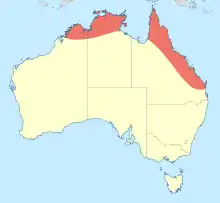| Australian cruiser | |
|---|---|
| Scientific classification | |
| Domain: | Eukaryota |
| Kingdom: | Animalia |
| Phylum: | Arthropoda |
| Class: | Insecta |
| Order: | Odonata |
| Infraorder: | Anisoptera |
| Family: | Macromiidae |
| Genus: | Macromia |
| Species: | M. tillyardi |
| Binomial name | |
| Macromia tillyardi | |
 | |
Macromia tillyardi is a species of dragonfly in the family Macromiidae,[3][4] known as the Australian cruiser.[5] It is a large, black to metallic green dragonfly with bright yellow markings on its abdomen, clear wings and long legs.[5] It is found in northern Australia,[6] where it inhabits streams and pools.[7]
Taxonomic history
Robin Tillyard collected the type specimen of Macromia tillyardi in 1905 and passed it onto René Martin for publication in his about-to-be-published work on Cordulines, in Collections zoologiques du baron Edm. de Selys Longchamps.[2]
Three females of this magnificent insect were taken by me at Kuranda, N.Q., in January, 1905. As M. René Martin is about to issue his work on the Corduliinae, it seems fitting that the record and description of so fine a species should appear in his new work. I have therefore sent him my description of the insect together with the type-specimen. It will be sufficient in this paper to give a short description only, so that the insect may be recognised by Australian collectors (Tillyard, 1906)[8]
Tillyard wrote his description and published it in November 1906,[8] several months before Martin's work was published on 17 January 1907.[2]
Gallery
.jpg.webp) Female wings
Female wings.jpg.webp) Male wings
Male wings
See also
References
Wikimedia Commons has media related to Macromia tillyardi.
- ↑ Dow, R.A. (2017). "Macromia tillyardi". IUCN Red List of Threatened Species. 2017: e.T87535424A87540064. doi:10.2305/IUCN.UK.2017-1.RLTS.T87535424A87540064.en. Retrieved 19 November 2021.
- 1 2 3 Martin, R (1907). "Cordulines". Collections Zoologiques du Baron Edm. de Selys Longchamps (in French). Vol. 17. Brussels: Institut royal des Sciences naturelles de Belgique. pp. 1–94 [72].
- ↑ "Species Macromia tillyardi Martin, 1906". Australian Faunal Directory. Australian Biological Resources Study. 2012. Retrieved 29 March 2017.
- ↑ Schorr, Martin; Paulson, Dennis. "World Odonata List". Slater Museum of Natural History. University of Puget Sound. Retrieved 29 March 2017.
- 1 2 Theischinger, Günther; Hawking, John (2006). The Complete Field Guide to Dragonflies of Australia. Collingwood, Victoria, Australia: CSIRO Publishing. p. 224. ISBN 978-0-64309-073-6.
- ↑ Watson, J.A.L.; Theischinger, G.; Abbey, H.M. (1991). The Australian Dragonflies: A Guide to the Identification, Distributions and Habitats of Australian Odonata. Melbourne: CSIRO. ISBN 0643051368.
- ↑ Theischinger, Gunther; Endersby, Ian (2009). Identification Guide to the Australian Odonata (PDF). Department of Environment, Climate Change and Water NSW. p. 224. ISBN 978-1-74232-475-3.
- 1 2 Tillyard, R.J. (1906). "New Australian species of the family Libellulidae. (Neuroptera: Odonata)". Proceedings of the Linnean Society of New South Wales. 31: 480–492 [491] – via Biodiversity Heritage Library.
This article is issued from Wikipedia. The text is licensed under Creative Commons - Attribution - Sharealike. Additional terms may apply for the media files.
